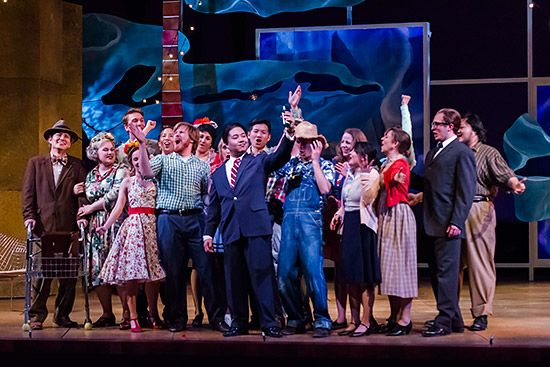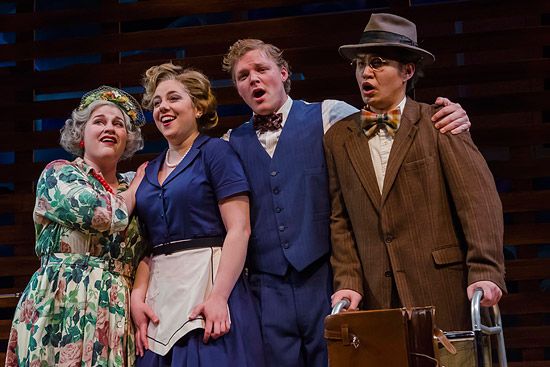Le nozze di Figaro, “the Perfect Opera,” at the BU Theatre This Weekend
Mozart favorite is CFA’s current offering
Mozart’s beloved comic opera Le nozze di Figaro offers a lavish, upbeat score, a libretto full of Shakespearean-style mischief, a thinly disguised commentary on wealth and class that underscores its continued relevance, and one of opera’s most memorable female leads.
When the College of Fine Arts presents Le nozze di Figaro at the Boston University Theatre tonight through Sunday, audiences will be able to enjoy “the perfect opera,” says David Paul, the production’s internationally known stage director. Sung in Italian with English supertitles, Figaro, from its joyous, foot-tapping overture to its spirited arias, is a feast for opera aficionados and novices alike, and the uninitiated are likely to be surprised by how much of the music is familiar (the score has been used in countless films and television commercials).

“Every year we follow something new—this year it was Emmeline, based on the Judith Rossner novel—with something from the treasure chest,” says conductor William Lumpkin, a CFA associate professor of music and artistic director of the Opera Institute and Opera Programs. CFA hasn’t staged a production of Figaro since 2001, and Lumpkin says it was time. The production is cast with students from the Opera Institute, and CFA students are performing in the orchestra and helming costume and set design.
The opera, which debuted in Vienna in 1786, is set in 18th-century Spain and sung in Italian with an original libretto by Lorenzo da Ponte, who later collaborated with Mozart on Don Giovanni and Così fan tutte. Unfolding on the wedding day of Figaro and the wiley Susanna, servants of Count Almaviva, the plot is a tangled web of lust (the philandering count has his eye on Susanna, whom he plans to bed on her wedding night), revenge (Figaro’s foiled scheme involving a feigned romantic ambush of the count, with the countess, his wife, on board), and the complications of an unpaid debt that threatens the union. And when it turns out that Figaro, abandoned as a baby, is not of the servant class as he’s assumed to be, the plot thickens, and thickens, until everyone—including the wronged countess and the adulterous count—offers forgiveness and regret. Identities and allegiances are sorted out, and the nuptials cleared to proceed. As in Shakespeare’s comedies, all turns out fine in the end.

“It’s the closest opera to the works of Shakespeare, with its complexity of characters,” says opera, theater, and film director Paul, whose most recent directing credit was Salome for the Los Angeles Opera. Despite having directed Figaro several times previously, he says he never tires of its depth, its unforgettable music, and its examination, although wrapped in comedy, of class and gender, a daring endeavor at the time it was composed. For this production, Paul has reset the opera, with a double-cast Figaro and Susanna, in 1960s California, against a backdrop of shake-ups in views of class and gender.
Da Ponte’s libretto was based on one installment of a trilogy written in 1778 by Pierre Beaumarchais that was considered so politically daring in its time that some say it foretold the French Revolution of 1789. While the play takes solid aim at the aristocracy, “the opera is more optimistic,” Paul says. “In opera, the bad are forgiven, and empathy wells up in the end.”
Le nozze di Figaro runs tonight, Thursday April 20, Friday, April 21, and Saturday, April 22, at 7:30 p.m., and Sunday, April 23, at 2 p.m., at the Boston University Theatre, 264 Huntington Ave., Boston. Tickets are $20 for the general public, $15 for BU alumni, WGBH members, Huntington Theatre Company subscribers, and senior citizens, $10 for CFA members, and $5 for students with ID. Members of the BU community can get two free tickets with BU ID at the door on the day of the performance. Purchase tickets here or call 617-933-8600. Take the MBTA Green Line to Symphony station or the BU Shuttle to the Mass Ave. stop.

Comments & Discussion
Boston University moderates comments to facilitate an informed, substantive, civil conversation. Abusive, profane, self-promotional, misleading, incoherent or off-topic comments will be rejected. Moderators are staffed during regular business hours (EST) and can only accept comments written in English. Statistics or facts must include a citation or a link to the citation.